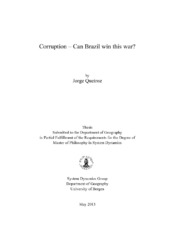Corruption - Can Brazil win this war?
Master thesis
Permanent lenke
https://hdl.handle.net/1956/11620Utgivelsesdato
2015-06-01Metadata
Vis full innførselSamlinger
- Department of Geography [634]
Sammendrag
Corruption in Brazil is endemic and has increased since the end of the military transition regime in 1985, a year marked by an indirect presidential election, which was followed by the 1988 Constitutional Reform. The present thesis answers the research question of how corruption affects well-being in Brazil" by investigating the existing cause-effect relationships and complex dynamics and logic between corruption and related variables in Brazil, with each of the twenty-seven causal diagrams being analyzed individually. Among the key findings are that (i) a center role is played by the level of quality of institutions, (ii) high corruption is a symptom of a fundamental problem with the independence, quality and effectiveness of the judiciary, and that (iii) corruption is dominated by fast destructive reinforcing loops that can deteriorate quite rapidly if left unwatched, and improvement to lower corruption levels is characterized by feedback loops with long delays. The present thesis also recommends anti-corruption policies that can result in lower levels of corruption and in improved well-being. Among the several policies recommended are: stop impunity of the corrupt, close the loophole on the penal procedure code that allows corrupt criminals to escape serving jail time, introduce severe jail sentences to the corrupt, strengthen control of corruption, strengthen the procedure for nomination of Supreme Court Judges and to ensure the independence of the judiciary, introduce the study of corruption at all levels of the school curricula, introduce a political reform to stop reelection and to strengthen the electoral system to promote the election of non- corrupt representatives, introduce policies to strengthen the control of the black market for currencies and illicit financial flows, including money laundering, trade misinvoicing, anonymous companies, tax havens, bank secrecy and others - ultimately, allow Brazil to win the war against corruption.
